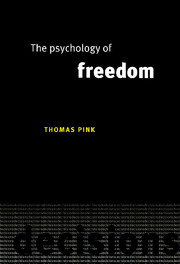Book contents
- Frontmatter
- Contents
- Acknowledgments
- Introduction
- 1 Agency and the will
- 2 Scepticism about second-order agency
- 3 Decision-making and freedom
- 4 The Psychologising conception of freedom
- 5 Decision rationality and action rationality
- 6 Decision-making and Teleology
- 7 The Regress argument
- 8 In defence of the Action model
- 9 The special-purpose agency of the will
- Conclusion
- Bibliography
- Index
4 - The Psychologising conception of freedom
Published online by Cambridge University Press: 31 August 2009
- Frontmatter
- Contents
- Acknowledgments
- Introduction
- 1 Agency and the will
- 2 Scepticism about second-order agency
- 3 Decision-making and freedom
- 4 The Psychologising conception of freedom
- 5 Decision rationality and action rationality
- 6 Decision-making and Teleology
- 7 The Regress argument
- 8 In defence of the Action model
- 9 The special-purpose agency of the will
- Conclusion
- Bibliography
- Index
Summary
THE PSYCHOLOGISING CONCEPTION AND PRACTICAL RATIONALITY
We have a Psychologising conception of our freedom. Freedom of action, as we conceive it, depends on the possession of a psychological analogue of that freedom – on the capacity for a free, action-determining second-order agency of the mind. It is up to us which actions we perform only because we have the capacity to decide which actions we shall perform, and it is up to us which such decisions we take.
The Psychologising conception of our freedom lies open to obvious objections. Why should our freedom of action presuppose any further kind of freedom? How can yet more of the same phenomenon be what makes the very occurrence of that phenomenon possible in the first place?
We need to find some explanation if we are to avoid a vicious regress. For suppose free actions do have to be explicable by the exercise of a free will. What of this further freedom of will? Will not it follow that its operations must, in turn, be explicable in the same terms – by free second-order willings? The regress threatens to be vicious first because, as we have already seen, the will is not subject to the will: our willings – our decisions and intention formations – do not appear to be explicable in terms of higher-order willings. And there must in any case be a finite limit to the orders of willing of which we are capable.
To stop the regress, we need the right kind of explanation for why the Psychologising conception of freedom is true.
- Type
- Chapter
- Information
- The Psychology of Freedom , pp. 101 - 136Publisher: Cambridge University PressPrint publication year: 1996
- 1
- Cited by



